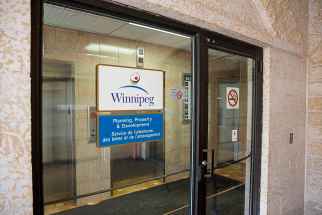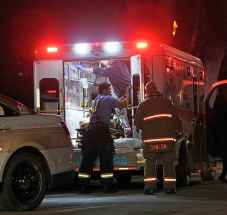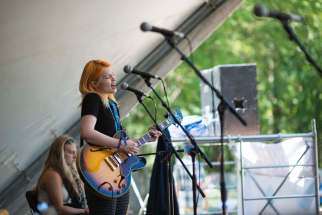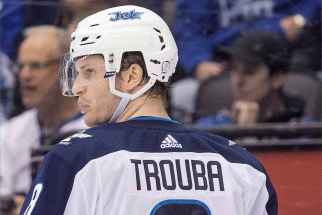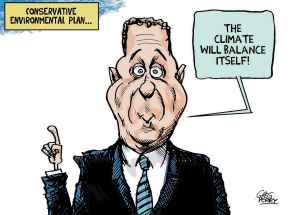Trouba trade might not be terrible, after all
Read this article for free:
or
Already have an account? Log in here »
To continue reading, please subscribe:
Monthly Digital Subscription
$0 for the first 4 weeks*
- Enjoy unlimited reading on winnipegfreepress.com
- Read the E-Edition, our digital replica newspaper
- Access News Break, our award-winning app
- Play interactive puzzles
*No charge for 4 weeks then price increases to the regular rate of $19.00 plus GST every four weeks. Offer available to new and qualified returning subscribers only. Cancel any time.
Monthly Digital Subscription
$4.75/week*
- Enjoy unlimited reading on winnipegfreepress.com
- Read the E-Edition, our digital replica newspaper
- Access News Break, our award-winning app
- Play interactive puzzles
*Billed as $19 plus GST every four weeks. Cancel any time.
To continue reading, please subscribe:
Add Free Press access to your Brandon Sun subscription for only an additional
$1 for the first 4 weeks*
*Your next subscription payment will increase by $1.00 and you will be charged $16.99 plus GST for four weeks. After four weeks, your payment will increase to $23.99 plus GST every four weeks.
Read unlimited articles for free today:
or
Already have an account? Log in here »
Hey there, time traveller!
This article was published 10/07/2019 (2344 days ago), so information in it may no longer be current.
The condemnation was swift and particularly biting in some corners.
“Worst trade ever!”
“We got robbed!”
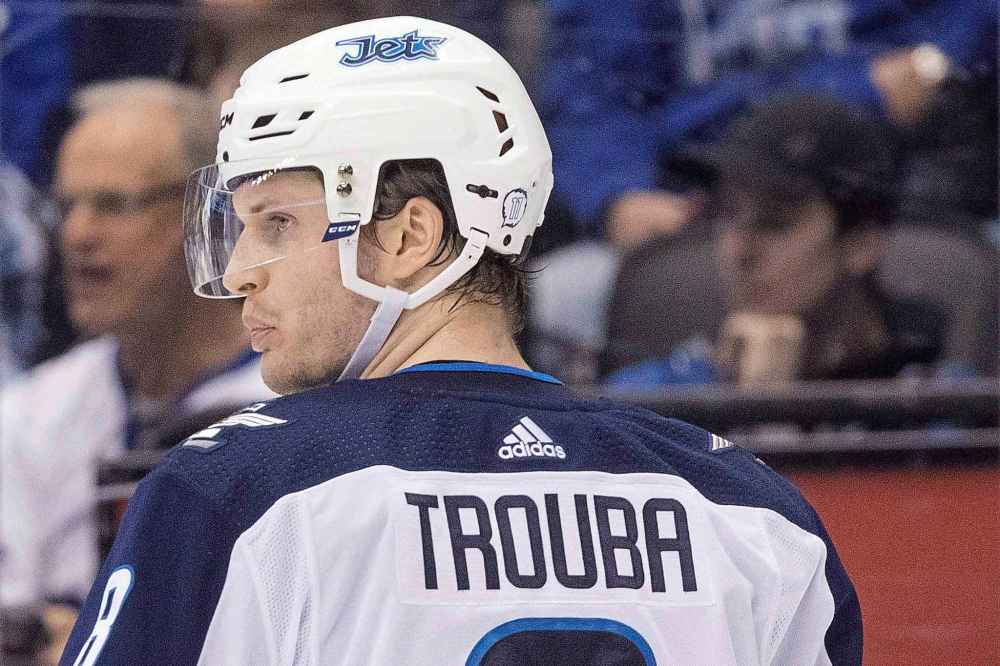
“What a joke!”
“Draft lottery here we come!”
You get the picture. It wasn’t pretty.
It’s safe to say many keyboard critics didn’t think very highly of the deal that sent Jacob Trouba to the New York Rangers in exchange for Neal Pionk and a first-round draft pick last month. There’s no doubt it changed the look of the Winnipeg Jets, especially on the blue line, which then got hit with the subsequent free-agency departures of defencemen Tyler Myers and Ben Chiarot.
But as we enter the dog days of summer and the dust starts to settle on a flurry of NHL activity, here’s a thought for the day: What if it doesn’t turn out to be gloom and doom for the home team, but actually ends up being just what they needed, serving both their immediate and long-term needs?
I know, I know, reserving judgment to allow for some time and perspective is a pretty crazy concept these days, where an immediate reaction seems to be the only way for some. And that’s especially true in the world of professional sports, where fans, critics, pundits and, yes, even us media types, have little to no patience.
Seriously, I saw a detailed article within minutes of the NHL draft concluding last month in Vancouver boldly declaring the “winners and losers” of the weekend. How anyone can instantly predict what a couple of hundred teenaged hockey players are ultimately going to turn out to be in a few years is beyond me.
But from where I sit, there is at least a hat trick of reasons this deal could eventually work out to be a win for the Jets. So if you’ll put your pitchforks down for a moment, allow me to make the case.
1. Let’s start with what was lost.
Yes, Jacob Trouba is a legitimate top-pairing defenceman, and his departure is going to leave a void. But here’s the thing: Trouba was miserable in Winnipeg and staying only for one more season. He would have bolted for nothing next summer as an unrestricted free agent.
Furthermore, Trouba was coming off a career-best offensive season where he made $5.5 million in arbitration. You may have noticed he’s again filed for salary arbitration, and is poised to take the Broadway Blueshirts to a hearing on July 25 if something can’t be worked out before then. There’s no doubt he’s due for a big raise, likely in the neighbourhood of $7 million per season, perhaps more.
Where would that money have come from here in Winnipeg? The Jets have about $20 million left in salary cap space to get Patrik Laine, Kyle Connor, Andrew Copp and what would have been Trouba, but is now Pionk, under contract. Forget losing Myers, Chiarot and Brandon Tanev on July 1 — general manager Kevin Cheveldayoff would have had to do even more surgery to this roster, with another popular player or two sent packing.
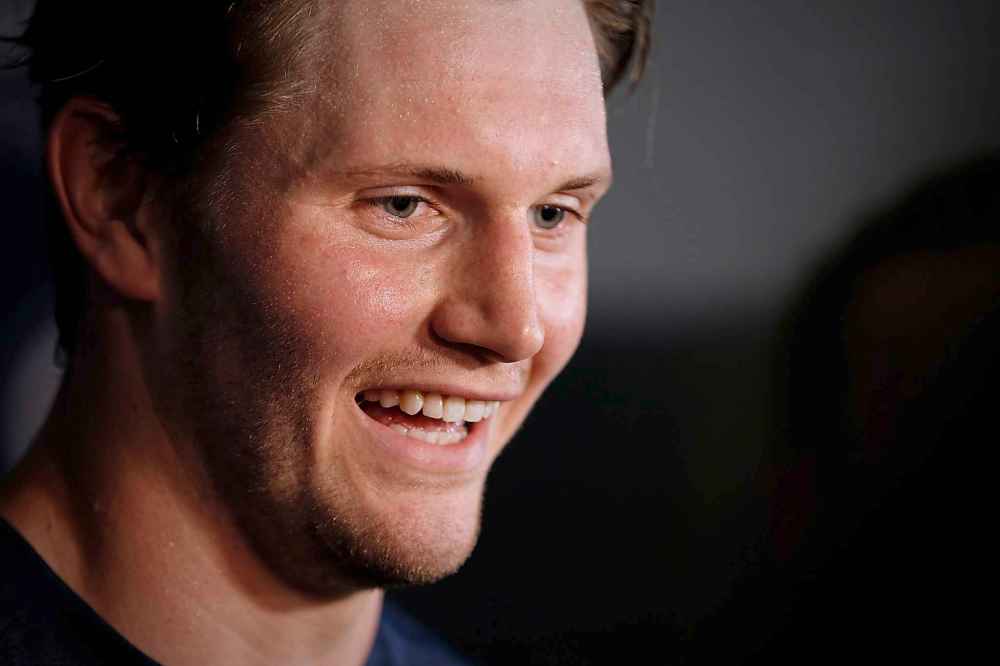
And all for what? A guy who wasn’t going to stick around under any circumstance. As a result, he had to be traded, and the sooner the better.
Trouba and his agent Kurt Overhardt are said to have given the Jets an extremely small list of teams he’d be willing to sign a long-term extension with, the Rangers being one of them. That means very limited options. Obviously the goal was to send him somewhere he might stay, to maximize the potential return, which is what happened in this case.
But what if Trouba ends up being one-and-done in the Big Apple? If an arbitrator has to settle this for a second straight summer, Trouba will get a one-year award that walks him right into UFA status next July.
How different might this trade look if that ends up being the case and the Jets got two assets for a one-year rental? Very different, I say.
2. Now let’s look at the immediate help that came back.
There’s no doubt Pionk doesn’t have the same pedigree or resumé as Trouba. One was an undrafted free agent signed out of college who has just one full NHL season under his belt, the other was a sure-fire, can’t miss first-round draft pick who’s been doing his thing for six years already.
But let’s not forget Pionk is just 23 — two years younger than Trouba — and logged big minutes and big responsibilities on a lacklustre team. He’s got size, can skate and play the type of mobile, puck-moving game that works in today’s NHL. And did you know only 25 defencemen had more power-play points than he did last year?
He’s also going to come in a lot cheaper for a Jets team that desperately needs to save every penny it can. The restricted free agent has an arbitration hearing set for July 24 if a deal isn’t reached by then, and I figure he’s going to get something in the neighbourhood of $2 million a season. I’ve seen other estimates out there ranging from as low as $1 million to as high as $3 million, depending on term. Regardless, he’s going to come a lot cheaper than Trouba would have.
And the ultimate value of that, and what else it allows Cheveldayoff to do with his roster, is tough to measure at this point.
Be honest: other than an occasional highlight package, how much have you actually seen Pionk play? Very little, I suspect. But before we all cast this guy as a slug on skates, can we at least allow him to take his first shift or two with the Jets this fall?
There’s obviously plenty of room for growth and development, especially when defencemen often take longer to blossom than forwards. What if he ends up being a more-than-capable defender on a cost-effective contract?
3. Perhaps you’re still not sold, which is certainly your right. But here’s one more thing to chew on.

Let’s not overlook that 20th-overall draft pick the Jets got from the Rangers, which turned into 18-year-old Finnish defenceman Ville Heinola.
The skilled, smooth-skating blue-liner is the true wild-card of this whole deal. There are some who already have him pegged as Winnipeg’s top upcoming prospect.
Yes, he’s likely a year or two away from making his pro debut in North America. But if Heinola ends up becoming a star for years to come, plus Pionk holds up his end of the bargain, the bitter taste that many had will be washed away.
It’s worth noting the Jets originally owned that pick, only to trade it (along with Brendan Lemieux) to the Rangers for Kevin Hayes. At the time, that seemed to be a reasonable deal for a Winnipeg squad that was trying to load up again for a Stanley Cup run. We all know how that turned out. Which is why, in hindsight, that move by Cheveldayoff now appears to be a bust, one I suspect he wishes he could have a do-over on.
It now looks like one of the worst deals he’s made, quite frankly.
But the same can’t be said for the Trouba trade, even if many have already drawn that conclusion. Time will certainly tell, but there’s enough here to suggest more than a few vocal armchair GMs may ultimately end up eating their words.
mike.mcintyre@freepress.mb.ca
Twitter: @mikemcintyrewpg

Mike McIntyre grew up wanting to be a professional wrestler. But when that dream fizzled, he put all his brawn into becoming a professional writer.
Our newsroom depends on a growing audience of readers to power our journalism. If you are not a paid reader, please consider becoming a subscriber.
Our newsroom depends on its audience of readers to power our journalism. Thank you for your support.

